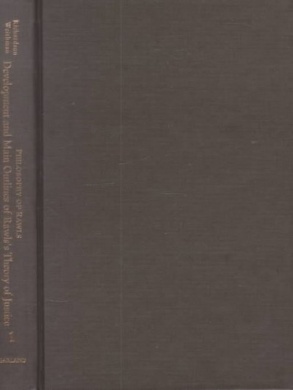Selected works in Political Philosophy
Democratic theory and democratic reasoning
Democratic Autonomy (Oxford, 2003)
Richardson asks what rule by the people, for the people, looks like in the modern administrative state, arguing that citizens must arrive at reasonable compromises through fair, truth-oriented processes of deliberation.
winner of the 2006 Herbert A. Simon Award (APSA)
winner of the 2006 David Easton Award (APSA)
subject of a 2005 symposium in Philosophy and Phenomenology Research (comments by Philip Pettit, David Estlund, and Thomas Christiano)
“Why Rawls’s Ideal Theory Leaves the Well-Ordered Society Vulnerable to Structural Oppression,” forthcoming in Paul J. Weithman, ed., Rawls’s A Theory of Justice at 50 (Cambridge University Press, 2023): 181-98.
“Taking Multidimensionality Seriously: Capabilities, Rawls’s Primary Goods and Guiding Action,” in Enrica Chiapperi-Martinetti, Siddiqur Osmani, and Mozaffar Qizilbash, eds., The Cambridge Handbook of the Capability Approach (Cambridge: Cambridge University Press, 2021): 146-164.
"Only in the Ballpark of Paternalism: Arrogance and Liberty-Limitation in International Humanitarian Aid," in Michael N. Barnett, ed., Paternalism Beyond Borders (Cambridge: Cambridge University Press, 2017): 47-74.
"Democratic Autonomy and Democratic Authority", in R. Celikates, R. Kreide, & T. Wesche, eds., Transformations of Democracy: Crisis, Protest, and Legitimation (Rowman & Littlefield, 2015).
“Relying on Experts as We Reason Together”, Kennedy Institute of Ethics Journal 22(2): 91–110 (June 2012).
“Estlund’s Promising Account of Democratic Authority”, Ethics 121 (2): 301–334 (2011).
“Our Call: The Constitutive Importance of the People's Judgment”, Journal of Moral Philosophy 5(1): 3–29 (2008).
“Public Opinion, Happiness, and the Will of the People: Policy-making in a Democracy”, in Beyond the Ballot Box (Thimphu, Bhutan: Centre for Bhutan Studies, 2010).
“Public Opinion and Popular Will”, in Deliberative Democracy in Practice, ed. D. Kahane et al. (University of British Columbia Press, 2009).
“The Stupidity of the Cost-Benefits Standard”, The Journal of Legal Studies 29(S2): 971–1003 (2000).
“Administrative Policymaking: Rule of Law, or Bureaucracy?", in Recrafting the Rule of Law: The Limits of Legal Order, ed. David Dyzenhaus (Oxford: Hart Publishing, 1999).
“Democratic Intentions”, in Deliberative Democracy: Essays on Reason and Politics, ed. James Bohman & William Rehg (Boston: MIT Press, 1997).
Capability approach [and the HDCA]
"Some Limitations of Nussbaum’s Capacities", Quinnipiac Law Review 19: 309–332 (2000).
“Rawlsian Social Contract Theory and the Severely Disabled”, The Journal of Ethics 10(4): 419–462 (2006).
“The Social Background of Capabilities for Freedoms”, Journal of Human Development 8(3): 389–414 (2007).
“Mapping out Improvements in Justice: Comparing versus Aiming”, Rutgers Law Journal 43(2): 211–242 (2012).
Liberalism
Moral Universalism and Pluralism (NYU Press, 2008)
In this volume, co-edited with Melissa S. Williams, contributors investigate the intersection of putatively universal moral principles with real-world diversity. The authors bring philosophical, legal and political perspectives to questions like: Which forms of pluralism are conceptually compatible with moral universalism, and which ones can be accommodated in a politically stable way? Can pluralism generate innovations in understandings of moral duty? How is convergence on the validity of legal and moral authority possible in circumstances of pluralism? Contributors include William A. Galston, Barbara Herman, F. M. Kamm, Gopal Sreenivasan, Robin West, and others.
Liberalism and the Good (Routledge, 1990)
In this volume, co-edited with Gerald Mara and Bruce Douglass, contributors tackle the challenge of justifying the value attached to toleration for liberal political theorists, since, in the face of mutually irreconcilable conceptions of the good, liberals instinctively caution against treating any of them as privileged, especially in the making of public policy. Contributors include Martha Nussbaum, Amy Gutmann, John Langan, Bruce Ackerman, Brian Barry, Kenneth Schmitz, Dennis Thompson, and others.
The Philosophy of Rawls (Routledge, 1999)
This collection of essays, co-edited with Paul Weithman, gathers together a wide-ranging selection of works in philosophy, economics, law, and the humanities dedicated to John Rawls and his pioneering work in political philosophy. The collection comprises five volumes, arranged in roughly chronological order, and features work by Joseph Raz, Susan Moller Okin, Joel Feinberg, Thomas Hill, Gregory Kavka, and many others.
“The Problem of Liberalism and the Good”, in Liberalism and the Good, ed. R. Bruce Douglass, Gerald M. Mara & Henry S. Richardson (Routledge, 1990).
“Rawlsian Social Contract Theory and the Severely Disabled”, The Journal of Ethics 10(4): 419–462 (2006).
“Liberalism, Deliberative Democracy, and 'Reasons that All Can Accept'” (with James Bohman), The Journal of Political Philosophy 17(3): 253–274 (2009).
“Interpreting Rawls: An Essay on Audard, Freeman, and Pogge”, The Journal of Ethics 15 (3): 227–251 (2011).
Other topics in political philosophy
“Mapping out Improvements in Justice: Comparing vs. Aiming”, Rutgers Law Journal 42(2): 211-241 (Symposium on Sen’s Idea of Justice, 2012).
“On the Sites of Remedial Justice: Colleges, Clinics, and the State”, in Equalizing Access: Affirmative Action in Higher Education in India, United States, and South Africa, ed. Martha C. Nussbaum & Zoya Hasan (Oxford, 2012).




